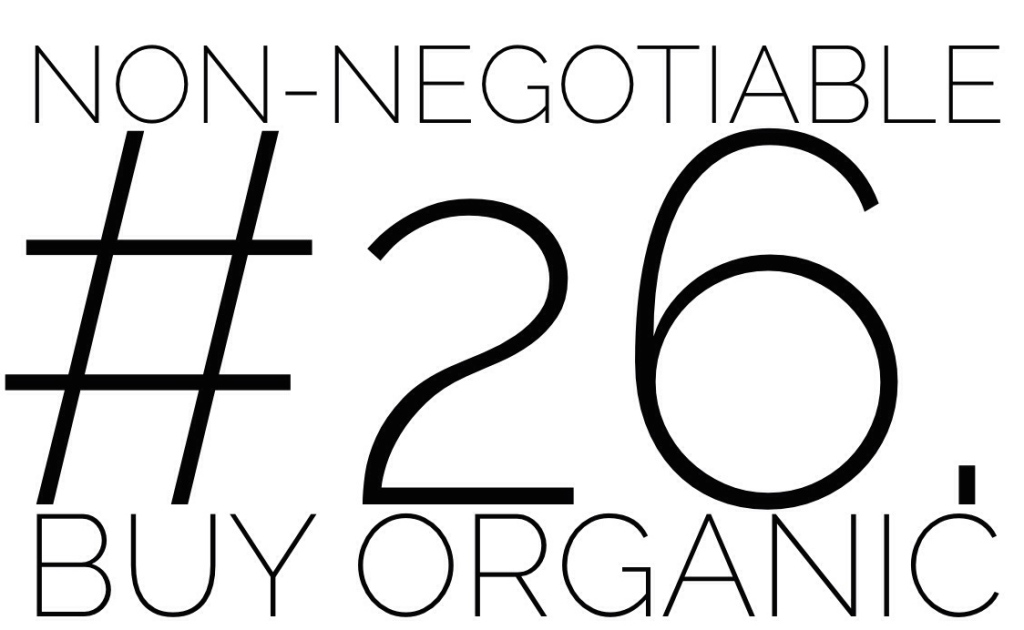 What is Organic Food and Why Should YOU Care?
What is Organic Food and Why Should YOU Care?
The Top 6 Reasons Why You Want To Buy And Eat Organic:
I remember when I first started to buy organic, it was a slow and steady process. Initially I was taken aback by the difference in prices between conventional and organic produce. A red pepper was and is $5.99 per pound. I just couldn’t make sense of it at the beginning, so I downloaded a handy app onto my smartphone, a guide offered by the Environmental Working Group called “The Dirty Dozen,” and bought produce according to their recommendations (you can download the app for FREE). This list offers a really great place to start, but as I found, over time I was developing a consciousness for the heartbeat of our planet, while I was caring for my own personal health and wellbeing by, so my considerations to buy organic began to expand. With my consciousness growing about the planet now, I began to notice the ways I spent my money on decadent evenings out, a beautiful home, with beautiful home furnishings, and “the latest” fashion-conscious clothing… but resisted spending on high-quality food for me sustenance.
At that point I made the executive decision to go rogue and buy straight up organic, 100%, non-negotiable, unless there is an item I need that is only available as conventional.
As a holistic health coach who is committed to SO much more than what I eat, SO much more than what you eat, I do begin with food, because I believe that the more we collectively heal ourselves, the more aligned we become with who we are and all that we are capable of, the more we will collectively heal our planet—as our consciousness moves beyond us individually, to “we” collectively. This makes sense to me, this is smart, for our children, and for our children’s children.
Treat the earth well: it was not given to you by your parents, it was loaned to you by your children. We do not inherit the Earth from our ancestors, we borrow it from our children.” Native American proverb
OK, organic refers to the way a food was grown, raised, or produced and is certified based on government-defined standards. Originally, all foods were “organic.” They were grown and prepared without pesticides, herbicides, chemical fertilizers, or irradiation. Foods were unrefined, whole, or minimally processed. Since World War II and the advent of chemical farming and food processing, the soils and foods of much of the world have been depleted of many important minerals and nutrients. Our food these days is not only deficient in nutrients, but also full of pollutants and farming chemicals. The modern process of denaturing foods via heavy refining and chemical treatment deeply affects the “life force” of our food supply, making it difficult for us to cultivate health and inner balance.
Research shows that pesticides create extra work for the immune system, causing cancer and disease in the liver, kidneys, and blood. Pesticides accumulate in the organs, resulting in a weakened immune system, allowing carcinogens and pathogens to filter into the body.1 Organic certification is our assurance that products have been grown and handled according to strict natural procedures.
THE TOP SIX REASONS TO BUY AND EAT ORGANIC PRODUCE:
- CHEMICALS: Pesticides are poison designed to kill living organisms. Many pesticides were approved long before extensive research linked them to cancer and other diseases. Organic agriculture is a way to prevent any more of these chemicals from getting into the air, water, and food supply.
- FUTURE GENERATIONS: Children are four times more sensitive to cancer-causing pesticides in foods than adults.
- WATER: Pesticides pollute over half of the United States’ primary source of drinking water.
- ORGANIC FARMERS: Three billion tons of topsoil erodes from croplands in the U.S. each year, and much of it is due to conventional farming practices, which often ignore the health of the soil. Organic agriculture respects the balance necessary for a healthy ecosystem.
- SAVE ENERGY: More energy is now used to produce synthetic fertilizers than to till, cultivate, and harvest all the crops in the United States.
- HELP SMALL FARMERS: Although more and more large-scale farms are making the conversion to organic practices, most organic farms are small and independently owned and operated. Organic agriculture can be a lifeline for small farms because it offers an alternative market where sellers can demand fair prices for crops.
We actually tell farmers with every purchase we make, what we value. If we collectively begin to buy organic, the farmers will heed our response. I mean, why would a farmer who grows “conventional” produce continue to farm that way when feeling the pain of no one buying his product. He will want to go with the tide of organic that is growing…
Even if you don’t eat at a fast food restaurant, you’re now eating food that’s produced by this system. ~Joel Salatin, American farmer
You have to understand that we farmers… we’re going to deliver to the market place what the market demands. If you want to buy $2 milk, your going to get a feed block in your back yard, it’s that simple. People have got to start DEMANDING good wholesome food of us and WE’LL DELIVER. I promise you we’re very ingenious people. WE’LL DELIVER, that’s all I have to say. ~Troy Roush, 5th generation American farmer





